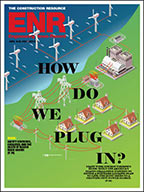New Jersey will move closer to becoming the nation's first offshore wind power producer if a planned 24-MW pilot project off the coast of Atlantic City obtains its last permit and approval under a state incentive program. The firm expects both as early as this fall.

Fishermen's Energy, a consortium of mostly East Coast fishing companies, has received all the necessary state permits to build a demonstration-scale, six-turbine offshore wind farm about 2.8-miles from Atlantic City, says Rhonda Jackson, Fishermen's Energy outreach director. The firm is waiting for a a water permit from the Army Corps of Engineers before it can move to the next phase, however. The firm expects to receive the permit "by late summer — the latest," Jackson says.
Fishermen's Energy is also waiting for the New Jersey Board of Public Utilities to approve its Offshore Wind Renewable Energy Certificate (OREC) application. ORECs help provide funding and tax credits to qualified firms that support offshore wind projects. The program is one of several under N.J. Governor Chris Christie's renewable energy initiatives that include the Offshore Wind Economic Development Act that passed last year and authorized creation of ORECs.
The BPU is reviewing the application, which so far is N.J.'s first and only one in state waters, says a BPU spokesperson. The agency anticipates opening an OREC application process for projects located in federal waters by year-end, he says. But he could not provide further details on that plan.
Fishermen's Energy would use the OREC as part of its funding mechanism, Jackson says. "We're hopeful that we'll have the [OREC approval] for the fall," she says. If the firm obtains the approval, Fishermen's Energy will proceed with construction.
The firm has already chosen Aecom for project and construction management as well as engineering and procurement services. Aecom declined to comment, referring calls to Fishermen's Energy.
Completion is expected in September 2012. Jackson would not comment on project costs or other possible construction-related contractors. "We're in various stages of negotiations with a network of contractors," she says.
Fishermen's Energy has performed pre-construction environmental monitoring and hopes to be cleared to start preliminary work for the interconnections by late fall. This would entail horizontal directional drilling underneath the beach and boardwalk and drilling into a conduit that connects to the power substation. "That work will be done off-season to avoid a lot of traffic issues" during the busy tourist season at Atlantic City, Jackson says. The firm plans to begin foundation work in the spring, turbine installation by next summer and commissioning over the Labor Day weekend 2012, she says.
Fishermen's Energy plans to follow up the demo-scale farm with a 350-MW project about 12 miles offshore in federal waters by 2015. However, like other proposed offshore wind farms in federal waters, this one faces an uphill climb without further support from the federal government, analysts say.
Fishermen's Energy's demo-scale project appears to be furthest along of all the nation's planned offshore wind farms. There are no offshore wind projects currently in operation or under construction in the U.S., says Brandi Colander, an attorney with the Natural Resources Defense Council's Air and Energy Group. One of the reasons for the holdup in federal waters is cumbersome permitting processes that can take 7-10 years, a formidable stretch when compared with the two-year timeline for coal plants, she says.
U.S. Secretary of the Interior Ken Salazar, Rhode Island senators Jack Reed and Sheldon Whitehouse and Governor Lincoln Chafee announced on Wednesday that the federal government is taking steps to accelerate the leasing process and to develop wind energy on the Outer Continental Shelf offshore of Rhode Island and Massachusetts.
That is good news for firms including Deepwater Wind, which plans to apply to the federal government for a 1,000 MW offshore farm in Rhode Island Sound, dubbed the Deepwater Wind Energy Center.
But Salazar's announced plans may not be enough to help Boston-based Energy Management Inc.'s Cape Wind, a 130-turbine, 420-MW farm proposed for Nantucket Sound. Cape Wind has been stalled in the development stage for more than 10 years amid a barrage of criticism over factors including increased costs that energy users would likely pay as well as aesthetic and environmental concerns. Also, while the developer has signed a power purchase agreement (PPA) for half of its planned output, it needs to find a buyer for the other half and secure financing for the project.
Meanwhile, DeepWater Wind's plans to build Block Island Wind Farm, a five-to-six turbine, 30-MW farm in Rhode Island state waters recently got a boost from a Rhode Island Supreme Court that upheld the developer's PPA with National Grid for energy to be generated from the planned farm. Deepwater Wind says it plans to begin site preparation in late 2012 and commercial operations in 2013. The project would generate more than 100,000 MW hours of power annually, supplying most of Block Island's electricity needs. The firm says that excess power would be exported to the mainland via the bi-directional transmission system.


